(Note: This is part two of Shannon’s story. We posted part one on Monday.)
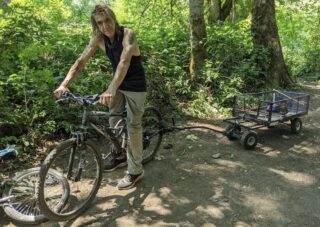
(Photographed with permission by Shannon Johnson)
This post began with my scouting of a new park for our family to visit on our bikes. It resulted in me coming face-to-face with homelessness in Hillsboro. Which is a unique reason why I think biking is so valuable: it increases our intimacy with our own neighborhood and local community. Biking opens our eyes to what is right around us, but that we might otherwise (in a car) never see.
My original intention was to check out the bike route and amenities at Dairy Creek Park. But after reading reviews that warned about various encampment-related ills (such as trash, feces, and unwelcoming encounters with campers) I was encouraged to also scout out park cleanliness and safety. But even more importantly, I was prompted to take an active interest in the needs of the houseless community near me — because this can’t just be about me. Yes, I want a clean and safe park for my children to play in, but I also — far more importantly — want my fellow neighbors to have a clean and safe place to live.
So I did some research.
According to the January 2021 Point-in-Time Count, there were 716 people in Washington County reported to be experiencing houselessness (including those in shelters and transitional housing). Of those, 357 people were unsheltered. The largest portion of unsheltered people in Washington County, 213, were counted in Hillsboro.
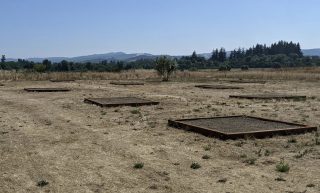
I guessed that the City was hoping to move many of the current Dairy Creek Park campers to a new managed campsite nearby, but I wondered what the folks currently living at the park thought about it. In the many articles and press releases I read about these projects, I saw almost no representation of the voices of the most important people to be considered: the houseless themselves. What do they think of these projects? And will they move to the managed camp or hotel-turned-shelter?
Lastly, to a much lesser degree of importance, what could I learn that might assuage my “mom fears” about bringing my kids to a park space noticeably shared by homeless campers? (Or would I be convinced to stay away?) So I decided to head over and check things out.
Advertisement
He explained that if his bike comes up missing, he just goes around and talks to the neighbors until he finds it and gets it back.
I spent a few hours wandering around the park, and particularly enjoyed talking at length to two of the unhoused folks, Denise and Martin. (Martin is a fellow cyclist. It made me ponder what people mean when they say “the bike community.” In many respects, there is a large divide between my life and Martin’s, but I really like thinking of us as being a part of the same community. Maybe next time, we can get a family photo, all of us together…the biking community!)
The conversations were meandering, but loosely focused on this question: Would you move to the new hotel-shelter downtown, or the managed campsite near the park? What message do you want others to hear about you?
[RELATED: What five people say about living outside along the Springwater path]
In response to moving, Denise said, “I would and I wouldn’t.” She didn’t mind camping out, but she was tired of being herded one direction, told to come here, then go over there. She suspected that most of the people currently living in/around the park would move to the managed camp. “None of us want to wake up every day and wonder if we’re going to have to move.” She looked forward to the stability of a sanctioned campsite and not having to worry if all of her stuff would be “cleaned up” and thrown away while she was absent. “I think the camp will allow me to start living my life.”
However, as Denise has been houseless for many years, she was well aware of the possible drawbacks of shelter efforts, drawbacks that often make shelter scenarios unrealistic, or too onerous, for the people that need them to be able, or willing, to use them. She didn’t mind rules such as being clean and sober, but she resented being policed, or treated like a child or second-class citizen. “I want to be a normal adult — who doesn’t?….There’s no reason we shouldn’t be treated like an adult in an apartment.”
Martin said that “If the rest of them [the community of park campers] go [to the managed campsite], I would go… There are some that don’t want the help. [But] Most of us want the help. I want to make sure the right people will get the help before me.”
Martin admitted that he liked living in the woods. “I’m a starving artist all the way,” he said with a smile. But he acknowledged some of the difficulties, “Laundry’s pretty tough.” I glanced at the creek behind us, the most obvious laundering option in the woods, and that made me wonder: the managed campsite didn’t advertise any laundry services, or showers (which seemed a more glaring drawback, as I considered the realities of long-term camping). “Anything’s better than nothing,” Martin answered. “All of us feel we’ve been left behind.”
Denise said, “I want people to not judge a book by its cover.” She wanted people to get to know each [houseless] person and situation. “There’s a lot of people out here, if their stories were told…different agencies would be willing to help. A lot of people in this community are here for mental health reasons or health reasons. There’s other people down here could use…the help.”
Both Denise and Martin made it obvious that the unhoused community in the area was a really close-knit community. I marveled aloud that Martin’s cargo bike (with his home-made e-assist, which I admittedly coveted), was left unlocked and unattended. “How is that possible?” I asked. He smiled, “we don’t lock our doors in the neighborhood.” He explained that if his bike comes up missing, he just goes around and talks to the neighbors until he finds it and gets it back.
At the time I met him, Martin had gathered up the multiple Winco Shopping Carts, which he was planning to return to the parking lot where they belong. (Winco is basically across the street, but it’s still a good walk over there, especially if one is pushing multiple carts). Denise mentioned doing this too, gathering carts, or collecting trash bags, then asking one of the younger/stronger men in the community to go take them where they should go. She cleans up regularly and even sweeps her campsite, with the hope that doing so will allow her to remain in the park, unmolested by clean-sweeps of campsites. Martin clearly did the same. But they both expressed that there is a group of campers (mostly the younger folks), that didn’t have the same regard. They left trash and didn’t seem to care. “But we’re teaching them,” Martin said, “We’re gonna keep this area clean.” Then curiously added, “They gotta realize this is a family place — it’s not Portland.”
These conversations gave me a lot to think about, as I pedaled over to the managed campsite on SW Wood Street. It was a peaceful looking spot, nestled against Jackson Bottom Wetlands in a largely industrial area, seemingly out on its own. Though the camp hadn’t opened at the time, porta-potties and handwash stations were set up. But again, I rued the lack of showers and laundry facilities (maybe they’ll add these?) Also, after visiting Dairy Creek on a hot day, I noticed the obvious: all of the members of the houseless community that I observed were taking shelter from the heat, in the woods, near the creek, or under the picnic shelters. It was way too hot to be sitting out in the sun. There is no shade in this managed campsite. How would folks deal with the heat? Furthermore, it is a much longer walk to get to any sort of food options. And I didn’t know any of the rules: Curfew? Pets? Allowed/prohibited personal belongings? Would people be allowed fires to cook? Camp stoves? I thought of Martin. What about bike parking? So many details, and any one of them could be the barrier, or the benefit, that would determine if an unhoused person will seek shelter there. Time will tell.
There are a few houses near the managed campsite, and most of the neighboring (housed) residents seem unwelcoming of the camp moving into their immediate neighborhood. I was able to speak to Damian, a nearby homeowner, who provided a unique perspective, in that he used to be a houseless veteran himself. He is frustrated that, in his opinion, the City is merely working to improve its image, rather than provide actual housing for people. “Out of sight, out of mind,” he fumed. He would much prefer to see efforts to “bring [unhoused folks] back into society, rather than shoving them out of sight, where no one can see them.” He spoke about the need for more ways to help people to receive housing. “You can’t get a rental contract if you live in a tent, or have a felony.” There are many barriers, and not many options. I asked him how he would feel if the city were building a low-income (or free!) apartment complex to house the currently houseless, on the same site. “That would be smart,” he replied. He would welcome it, if it was real housing, with showers, services. And I admit, I was beginning to share that sentiment. I know, temporary and immediate options can be, “better than nothing” (in Martin’s words), but with the lack of showers, shade, laundry; it felt like it was something, yes, but not nearly enough.
As for my perceptions about trash and safety, and taking my kids to Dairy Creek Park? I’m still turning that over in my head and heart. That will be a future post, and hopefully I’ll have the kiddos in tow. Because this is just the beginning of the conversation. And it’s a conversation I also want my children to be a part of. We all share this space, and we need to figure out how to do so, better, together.
And I know, I’m just on my bike in this little corner of Hillsboro.
What is happening in your corner of town? How do people living outside affect you and your use of parks and public spaces? What solutions do you see working (or failing)? And if you are houseless or formerly houseless, please let us know what has helped or hindered you.
— Shannon Johnson, shannon.marie.johnson915@gmail.com
— Get our headlines delivered to your inbox.
— Support this independent community media outlet with a one-time contribution or monthly subscription.



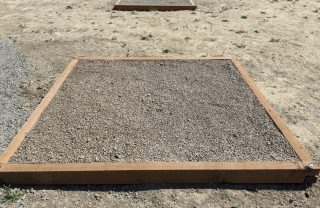
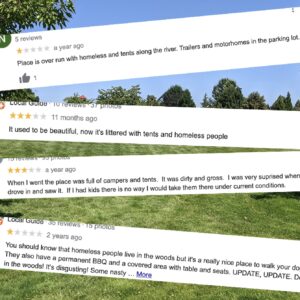
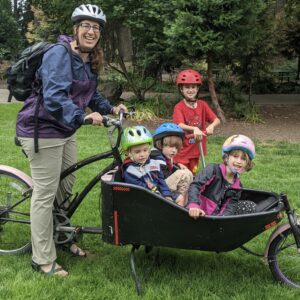
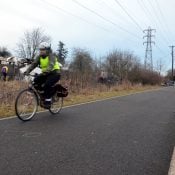

Thanks for reading.
BikePortland has served this community with independent community journalism since 2005. We rely on subscriptions from readers like you to survive. Your financial support is vital in keeping this valuable resource alive and well.
Please subscribe today to strengthen and expand our work.
Thanks for this interesting article.
Among the many issues raised and identified in this article is the meaning of the word community. I wonder sometimes if what we mean by community is just ‘group of people with a similar trait’ as opposed to people who know and spend time with each other.
Is there really a bike community? Are people living in a park part of the greater community? If there are people on my block I don’t know or talk to are we part of the same community?
What do we mean when we use this word?
I think we probably mean different things depending on whether we’re talking about a “community” we believe we are part of, as opposed to a “community” we think is made up of other people.
This really set me to thinking. Thank you so much for this article, it was humane and thought provoking
I would like to point out that the Oregon Mortgage Relief COVID – 19 fund is closed. The state of Oregon could re open this funding source and allow landlords and homeowners additional entry into the application portal. The rent relief application process is too hard.
There is a slush bucket of Oregon funding that is not going to mortgage relief the way press releases are spouting. I don’t think this is gonna be fixed by the end of September.
What if the State of Oregon gave industrial areas “homeless rent relief money” to help them provide critical services like porta potties. While we wait for more housing to be built? Thank you sanitary service providers.
Is this only your second (and a half) published article? Damn, well done.
Chronicles of a broken society. So sad that this is the richest and supposedly greatest country.
This is the best reporting on the unhoused/homeless I have run into. It is amazing how few “reporters” actually talk to the subject of their reporting.
Interesting comment – “this isn’t Portland”
That struck me also – and while just one person, it’s a tacit admission that things are worse in town.
Totally agree. It’s easy to simply say, “these folks should just move to the managed campsite.” It’s much harder to actually talk to these people, hear their concerns, and investigate why the managed area may be insufficient. Looking at Shannon’s photos has me wondering: who would want to live completely exposed like that, without some important services, when they’re getting by well enough in a forested park?
Thanks for the excellent article, Shannon. I appreciate the thoughtful examination of what constitutes community and belonging as shared by an unhoused neighbor. Well done.
I have to echo the other comments: this is a great article. Well written, personal, humane and realistic. Great reporting.
“They gotta realize this is a family place — it’s not Portland.” Bingo.
“houseless”” It’s a euphemism. What’s a euphemism? ‘a mild or indirect word or expression substituted for one considered to be too harsh or blunt when referring to something unpleasant or embarrassing.’ I don’t like it when a writer seeks to blend in manipulating the reader with informing same. The word “houseless” Implies a lack of agency on the part of those living on the street, as in ‘my god, I’m houseless! How did this happen? Who did this to me?’ Later on, the writer refers to other people as ‘housed’, the clear implication being that, at any moment, their status could move to the other extreme.
It does ‘take a village’ to solve a community’s challenges. Aren’t people living on the street part of that community? Don’t they have agency in solving the communities’ problems? How is the problem of people camped out on the streets to be solved if those people don’t participate in the solution? The two people interviewed in this article, IMO, are seeking to establish the terms of the charity they would be receiving. They seem to be working really hard at making comfortable, ‘houseless’ lives for themselves; could they not work at the many, plentiful jobs currently available? Two $15 an hour jobs could provide up to $5,000 a month in income, more than enough to pay rent.
I would like to have seen the writer ask them where they got their nice cargo bike. Did they buy it from a legitimate source or ?. It’s particularly grating to read that they feel it safe to leave the bike unlocked. I ride a nice Trek 520 I’ve had for years. i don’t bring a lock when I ride as there is no way I would leave the bike locked or unlocked on the street. Who, on Bike Portland, does not feel the same?
Two weeks ago I witnessed a ‘houseless’ person beating the hell out of a woman who had the nerve to move in next to him (I guess he doesn’t like the ‘houseless’ either). He was apparently arrested and released as he is still living in his tent at the same location. The stick he used to beat this woman was leaning against the wall of the business he is camped out at shortly after this occurred.
Having said all this, although I have little sympathy for the viewpoint of the writer, I did enjoy reading and getting this perspective. I just don’t agree with it.
Houseless was chosen as new term for its lack of emotional valence and further implication as compared to ‘homeless’. Lack of agency is your implication, and isn’t necessarily shared.
To then go on to decry the interviewed seeking to apply agency to what forms of charity they’re willing to accept is frankly bizarre. Should they apply agency or shouldn’t they?
The phrase ‘lack of emotional valence’ is interesting and I think it fits into what I’m getting at. Human agency is the capacity for human beings to make choices and to impose those choices on the world. ‘Making’ choices and ‘imposing’ those choices are actions and, to me at least, imply some emotional predisposition. One has to be excited, interested, angry . . . . . . possess SOME emotional spark in order to have ‘agency’.
I find your assertion that someone picking and choosing the charity they are willing to receive as being an example of ‘agency’ to be accurate but it really diminishes the positive concept of what agency is: the power of the individual to choose their fate. Is someone choosing or rejecting shelter for a night really executing their ‘big plan’? The big plan that all of us possess?
Someone choosing or rejecting shelter for a night is applying agency and exercising a very basic freedom, yes. That you do not like what someone else is doing with their agency, or how far-reaching of a plan it seems to be in service of, doesn’t make it not agency.
“Houseless” is just one stop further on the euphemism treadmill. Once it becomes widely used, it will take on the same emotional valence of “homeless”. I don’t like it because it is less accurate (apartment dwellers are houseless after all), and it mostly feels like an unnecessary word.
The emotional valence of the word comes from the association of the homeless population with drug addiction and mental illness, both of which are stigmatized. Changing the word can escape that association for only so long, at which point we will need yet another word that is probably less fitting even than “houseless”.
I believe most people living on the street are there because of incapacity, and we need to make serious investments in mental health and drug treatment in order to resolve the problem. Everyone blames the city, but these issues fall under the mandate of the county, who have thus far proven utterly ineffective in finding a resolution.
Changing the word does not help solve the problem.
The point is that the word doesn’t imply the lack of agency the original commenter suggested.
I agree with you that we need to make serious investments in mental health, drug treatment, and housing.
Personally I don’t terribly mind the term ‘homeless’, though I see ‘unhoused’ as more accurate. regardless, none of the currently accepted terms suggest lack of agency to me.
The trouble with words like “homeless”, “houseless”, or even “crippled”, is that they attempt to describe an entire class or group at once. In my mind, the only way off of this treadmill is to refer to individuals as individuals, and name the actual “problem” you are using to describe them.
“Oh, that guy doesn’t have anywhere indoors to stay tonight”. “That person has Down Syndrome”. “That person has addiction issues”.
Yes, even some of the conditions we could name have undergone acceptability changes; we don’t [officially] diagnose anyone as a moron or idiot anymore, for example, but it still seems better to address and describe individuals as individuals to the extent possible. Would you rather be a “cyclist” or a “person on a bike”?
In many contexts, at the individual level, I would agree, but at the collective level, where so much of the conversation takes place, referring to “people suffering from untreated mental illness*, unrepentant addicts, societal dropouts and street criminals, and folks who don’t have the resources to withstand a streak of misfortune” seems cumbersome in comparison to focusing on what they have in common: they’re living on the street (i.e. without a home as traditionally construed).
I find using “living on the street” to be much better than any of the more popular euphemisms — it is both more descriptive and non-essentialist.
*Confidential to Multnomah County: Why aren’t you providing the health resources these people so desperately need?
No manipulation attempt here. And I can say that as the editor of this piece. (I’m sure Shannon can speak for herself, but with 4 kids I know she has only limited time to respond to comments).
I think a lot about words, especially on sensitive topics like this. I also dislike when I think people are bending over backwards to use a PC term without really thinking much about it. In this case, I disagree with you about “houseless”. I think it’s a good term because a “house” is an object. These folks have a home, it’s just not inside a house. I’m also not super black/white when it comes to terms and words. If I feel like “homeless” is appropriate in a certain context, I will use it. Language is always evolving and I think it requires a lot of thought and discretion to get it right.
But isn’t that just trading one inaccurate term for another? My neighbors live in cars, apartments, ADUs, duplexes, condos, townhouses, and detached single family. They all have homes, but relatively few have actual houses.
Far be it from me to tell people how to identify themselves, but people without housing are “unhoused people.” It is accurate, humanizing, and uncontrived.
Now that you’ve concluded the grammar lesson, perhaps you have some thoughts on the abject human misery surrounding your dwelling unit?
It’s dumbfounding to me that an adult can read this piece and have this reaction. Maybe try re-reading it, as I think you missed something important.
I am picky about word choice too. And I recognize that my meaning/intention in using a certain word will not always be the meaning that is received by the reader, based on that reader’s individual experiences and culture. That makes it tricky! For what it’s worth, I chose “houseless,” not as a euphemism or expression of agency or lack thereof, but as a way to describe what I truly hope is a temporary circumstance: individual persons who currently don’t have formal housing. In my experience, and for me personally (mea culpa!), “homeless” often suggests/imposes an identity on a unique individual, usually a derogatory one: “That homeless person,” with “homeless” being the defining identity given (from the outside) to that individual and group. Here, I wanted to avoid doing that, emphasizing that folks are unique individuals with different housing statuses and that we (housed and unhoused) are neighbors and share the same community in various ways. “Houseless” or “housed” doesn’t define us, but distinguishes the external conditions of our current living situation. I prefer to use the term “homeless” when referring to a societal problem (rather than individual person), a term that I see including/emphasizing the whole range of issues/needs associated with the houseless population: mental health, physical health, addiction, employment, poverty, education, access to services, etc.
I sure won’t always get the wording right, but I am definitely thinking about it, and I appreciate the feedback.
I had a much wordier comment started, but didn’t want to ramble. The gist was that there are likely many problems experienced by the houseless; how do we identify and start solving those individual problems, rather than just attempting to fix the “problem” of having visible campers that make other people uncomfortable? Also, how does one best help someone who doesn’t want the help, or “doesn’t mind” living in the woods? How can we convince hopeless or apathetic folks that exerting effort will make things “better” for them?
I appreciate the well researched and informative point of view.
This conflicts with experiences others report. An extreme example is this incident in Seattle. I would not risk my children in this kind of area
https://www.kiro7.com/news/local/couple-attacked-man-killed-while-retrieving-stolen-items-seattle-homeless-encampment/EFALVP4AENHFBEFZRKHFE7JLKU/
Is there any action being taken to address the heat concerns you raised in this story?
According to several studies over 50% of homeless people have traumatic brain injuries. When you truly can’t keep it together to show up for appointments or pay bills because of memory problems, can’t control emotions or impulses — you’re not going to be able to manage an apartment or a job, or follow a lot of rules because of memory and lack of impulse control.
This doesn’t even include mental illnesses like bi-polar or schizophrenia, where you’re also dealing with delusions in some cases.
We lost institutions in the 80s and those folks were dumped on the streets without an effective alternative. I’m old enough to remember this and had many friends who were social workers trying to deal with that horrifying influx. We treat homeless people like its their own doing or economics, that’s completely ineffective for most of them.
We need to provide places, true shelter, for people who cannot manage homes of any kind again, evolved with what we know about care.
https://journals.lww.com/neurotodayonline/fulltext/2020/02060/traumatic_brain_injury_in_homeless_people_is.4.aspx
Hello again! I was on vacation with my kids when this post went up and I intentionally had my computer turned off for a few days. I appreciate all the responses, including (sometimes especially) the critical/dissenting voices. I LOVE how active the comment sections are on BikePortland, and I frequently learn just as much from reading the comments and discussions as I do from the articles. Thanks to everyone who has chimed in. I look forward to continuing the conversations.